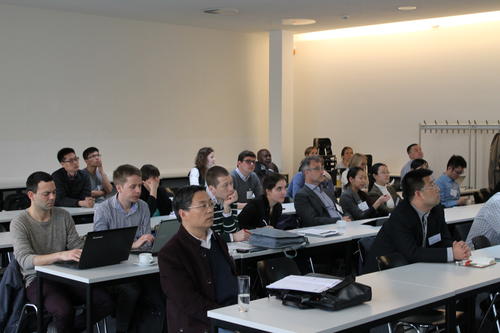University Alliance for Sustainability: Spring Campus 2016 “Connecting Communities for Sustainability: Do Universities Matter?“
University Alliance for Sustainability: Spring Campus Conference 2016
“Connecting Communities for Sustainability: Do Universities Matter?“
From April 11-15, 2016 Freie Universität hosted the first UAS Spring Campus event of the University Alliance for Sustainability on the topic “Connecting Communities for Sustainability: Do Universities Matter?”
Following a whole institution approach, the UAS (Spring Campus) Conference brought together researchers, management staff, as well as PhD candidates and students who contributed to a lively discussion of the event’s topic. The program was opened by the vice-president of Freie Universität Prof. Brigitta Schütt, Prof. Dr. Klaus Töpfer, former Executive Director of the United Nations Environment Programme and former German Minister for Environmental Protection as well as Walter Hirche of the German Council for Sustainable Development.
A growing number of universities share an understanding of the “sustainable university” as an institution that systematically develops occasions, spaces, and projects to meet global environmental and societal challenges. This is relevant not only in research and teaching, but also in terms of campus management. The partners of the University Alliance for Sustainability, see it as their responsibility to actively shape this global discourse and to address the corresponding challenges by implementing a whole-institution approach.
Transformation towards sustainability demands the dynamic interaction of various actors and an extraordinary breadth of topics, approaches and methodologies. We all know the vast human intellectual potential in higher education institutions, yet, one of the organizational obstacles universities face is their highly differentiated and segmented structure. Sustainability, however, calls for continuous interaction and integration, one of the key questions being: How can we integrate a cross-sectional task like sustainability into a segmented structure? Projects taking a holistic approach, which focus on the entire university in order to bridge the various departments and entities of higher education organizations, might be one important solution to this challenge. Other suggested solutions include: hosting transdisciplinary dialogue with civil society stakeholders and continuously working towards improvement.
The Opening Day showcased the overall theme of the event and invited participants to critically evaluate and discuss the relevance of universities to the topic.
On the following two days the Spring Campus featured four parallel running research and management workshops:
- Workshop I: “Climate Governance in International Comparison” headed by Prof. Miranda Schreurs
- Workshop II: “Education for Sustainable Development – Indicators for Assessment and Monitoring” headed by Prof. Inka Bormann
- Workshop III: “Traditional Watershed Management” headed by Prof. Brigitta Schütt
- Management Workshop: “From Vision to Commitment: Sustainable Campus Management” headed by Andreas Wanke and Katrin Risch
Additionally, a PhD Conference was organized by the Environmental Policy Research Centre, focusing on “Challenges & Opportunities for Sustainability: International Perspectives”, which completed the Spring Campus with a two-day meeting.
During the Spring Campus, more than 120 researchers, practitioners and students from 19 universities, 8 institutes and 11 different countries contributed to the international sustainability discourse. They critically reflected on the role of universities as societal actors and the integral function of communities and community engagement. Building and engaging communities to jointly develop and maintain sustainable societal solutions will be paramount in the “Great Transformation”. Coming from different cultural and professional backgrounds, participants also focused on how international networks can connect communities and trigger engagement in sustainability. The Alliance therewith hopes to contribute to spreading innovative ideas, interesting research and sustainable campus solutions across the globe and to spark extended dialogue between all stakeholders on campus and beyond.
A complete conference documentation is available in the UAS Pool.
